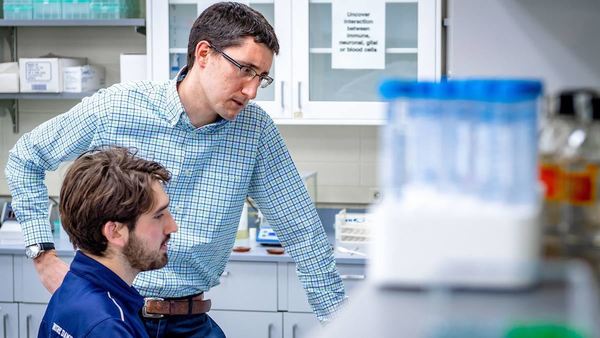
The University of Notre Dame has received a Collaborative Pairs Pilot Project Award from the Chan Zuckerberg Initiative to study genes that affect neurodegenerative diseases, such as Alzheimer’s disease.
This is Notre Dame’s first award from the Chan Zuckerberg Initiative.
The award will fund a partnership between Cody Smith, the Elizabeth and Michael Gallagher Associate Professor of Biological Sciences at Notre Dame and a 2017 Alfred P. Sloan Fellow, and Beth Stevens, member of the Broad Institute of MIT and Harvard and a 2015 MacArthur Fellow. With their combined expertise in neurological development, they will explore how gene expression and function changes with aging, allowing neurodegenerative diseases to occur.
“Instead of looking at an individual gene, our approach is to look at a suite of genes that work individually or together and decipher what their core function is,” Smith said. “By understanding their combined function we can get a better picture of what is happening in the brain and, eventually, why they enter disease states.”
Stevens’ team uses cutting-edge sequencing to identify multiple genes and how they are expressed at different ages. Her team will provide a list of genes to the Smith Lab, which will use advanced imaging approaches on a zebrafish model to analyze which genes are important for modifying microglia, or the cells that are responsible for regulating brain development and healing injured tissue. Stevens’ team will simultaneously analyze the genes in human microglia.
Together, the researchers will look at how those microglia shift into disease states and therefore may not work properly in defending the brain against neurodegenerative diseases.
“We don’t really know how specific risk genes change microglia function in disease. This collaborative project will allow us to develop new tools to track and manipulate microglia to better understand how genes relate to function and to identify conserved mechanistic pathways,” Stevens said.
The award will provide $200,000 over an 18-month period, and Smith and Stevens will also gain long-term access to the Chan Zuckerberg Initiative Neurodegeneration Challenge Network. The network offers support, mentoring and collaborative interactions with researchers across a broad range of fields to foster collaboration for tackling neurodegenerative disease.
Contact: Brandi Wampler, associate director of media relations, 574-631-2632, brandiwampler@nd.edu
Originally published by at news.nd.edu on February 21, 2024.